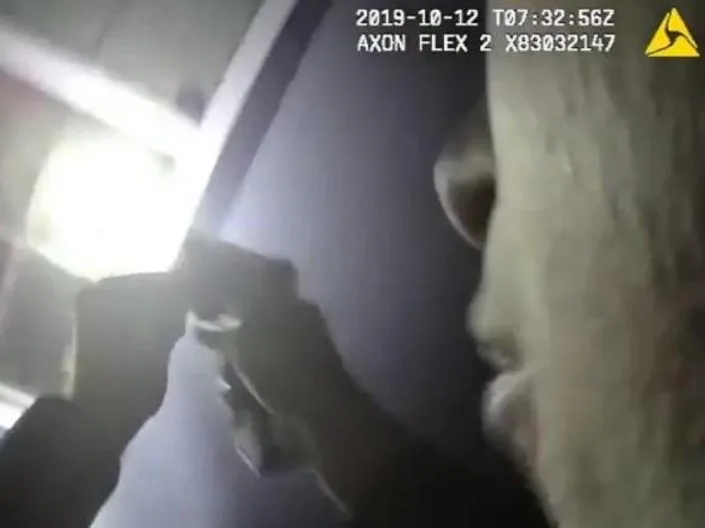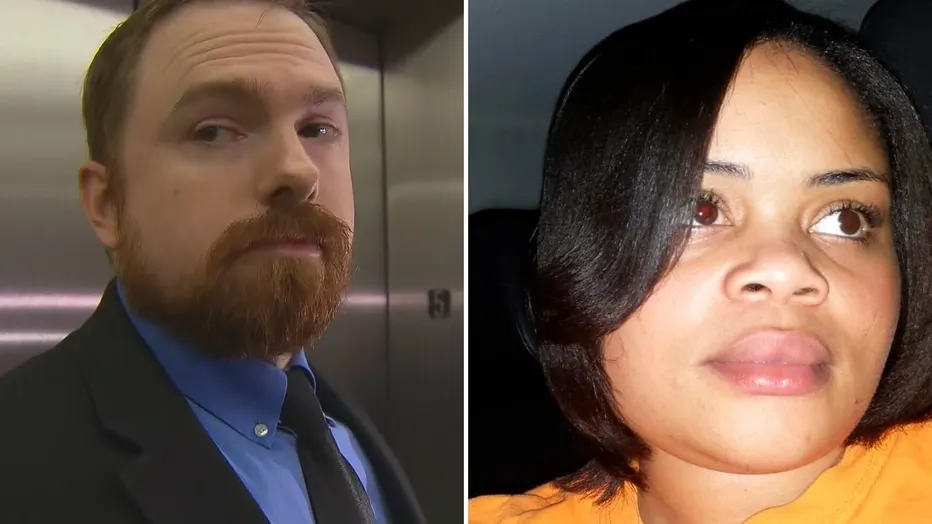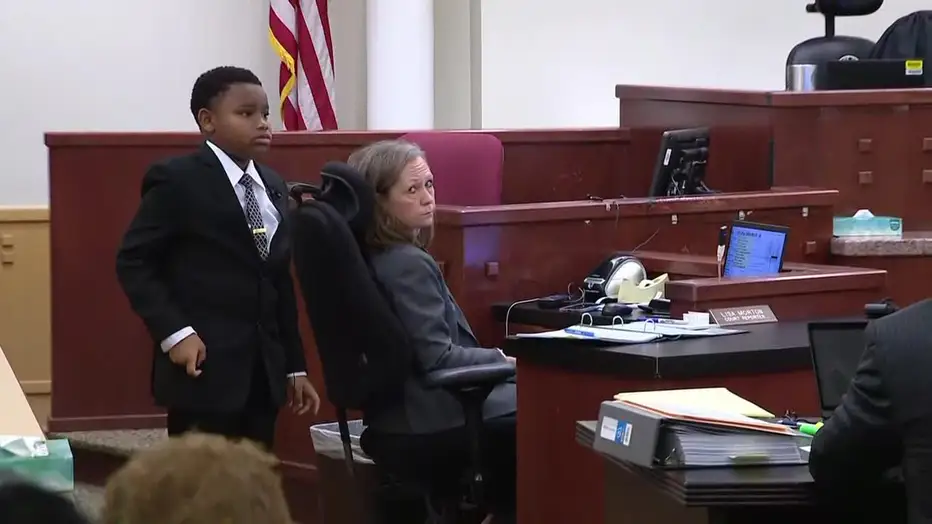What happened to Atatiana Jefferson, as trial begins for Texas police officer Aaron Dean who shot her in 2019
Opening arguments are underway in the trial of former Fort Worth, Texas, police officer Aaron Dean.
The 38-year-old is charged with murder for shooting 28-year-old Atatiana Jefferson in 2019 just moments after beginning a non-emergency welfare check at her home.
The case, involving a white officer and a Black victim, occurred seven months before the police killing of George Floyd galvanised nationwide racial justice protests.
It touches on many of the same issues that would later bring millions of Americans into the street in 2020: aggressive police use of force; strained dynamics between white officers and communities of colour; and the difficult question of how best to reform police departments in America.
The shooting
Police were called for a welfare check at 2.23am on 12 October, 2019, on a non-emergency line, after a neighbour noticed Jefferson’s front door was open uncharacteristically for that time of morning.
At the time, Jefferson was playing video games with her eight-year-old nephew, Zion, and had opened the doors to vent smoke from hamburgers she was cooking.
Without knocking at the door, turning on their police lights, or otherwise announcing themselves, Dean approached the outside of the home, investigating parked cars and eventually letting himself into the backyard through a gate.
There, according to body camera footage, Dean saw Jefferson standing at the back window, and yelled, “Put your hands up, show me your hands!” before firing a shot through the window moments later.
The officer did not identify himself as a policeman.
Zion told a forensic investigator trained to work with children that his aunt had heard suspicious noises in the yard, picked up her gun, and went to investigate. Dean claims he saw the silhouette of Jefferson holding a gun, with the beam of a green laser sight pointing outside, before he shot.

Who was Atatiana Jefferson?
According to family members, Jefferson, who went by the nickname “Tay” to those close to her, was a loving relative with big dreams about pursuing a career in medicine.
“She was part of the first generation of people in my family to go to college,” her sister Ashley Carr told The New York Times. “There were plenty of days of struggling, plenty of days of eating ramen noodles for dinner. But that wasn’t a deterrent for her.”
Just before the shooting, Jefferson put these career ambitions on hold and moved from Dallas to Fort Worth to care for her ailing mother.
“Whoever she really cared for, she went all in for it — people and animals,” Ms Carr added.
The response
Unlike most investigations of police use of force, transparency and punishment, at least at first, arrived swiftly after Jefferson’s death.
Two days after the shooting, Dean resigned from the FWPD and was charged with murder.
City officials, including the police chief and Fort Worth’s Republican mayor, were quick to condemn the violence for shattering community-police trust.
“It’s very emotional because the officers try hard every day to make this city better. They’re trying to build these relationships,” the interim police chief at the time, Ed Kraus, said. “I liken it to an anthill. And somebody comes with a hose and washes it all away.”
The killing, though it didn’t receive the kind of nationwide attention that later police slayings would, touched a nerve in the Fort Worth community.
For some, Jefferson’s shooting was another example of racist state violence in a region with a long history of red-lining and a majority white police force overseeing a population that’s majority Black and Hispanic.
Just days before Jefferson was killed, Amber Guyger, a white former officer in nearby Dallas, was sentenced to 10 years for killing Botham Jean, a Black man, in his own apartment, after the officer mistakenly believed he was an intruder in her home.
For others, Jefferson’s death, and the fact that her name did not seem to join the national conversation of wrongful police killings, was an indication of the ways the experiences of Black women are erased.
In Fort Worth, protestors pointedly chanted, “Say her name.”
“The families of these women often suffer in relative obscurity,” Black feminist legal scholar Kimberlé Crenshaw, who created the #SayHerName hashtag, wrote at the time. “Their daughters’ deaths don’t elicit the marches or news coverage that could catalyze accountability. When most people think about anti-black violence, like lynchings or police killings, they think about men. Women rarely come to mind first.”
The trial
Despite the unexpectedly swift punishment for Dean, it took more than three years for him to head to trial.
The case was delayed by legal wrangling, the death of his primary attorney, the removal of the initial judge overseeing the case, and claims from the former officer’s team that statements from local officials about the shooting would bias the outcome.
Dean, who has pleaded not guilty, claims he reasonably believed he was in danger.
Miles Brissette, his attorney, told the court on Monday the house Dean was called to investigated “looked like it’s been ransacked,” and that the officer had reason to fear for his safety.
“That gun was relevant,” Mr Brissette said. “This is a tragic accident.”
Critics have argued that Jefferson’s killer may not face a competent jury to handle this complex case, after the court approved a majority white panel with no Black members.
“After YEARS of delay, the murder trial of the former Fort Worth police officer accused of fatally shooting Atatiana Jefferson in 2019 is underway,” civil rights attorney Ben Crump wrote on Twitter on Monday. “Unfortunately, the jury doesn’t include a single Black juror. I am praying that her family receives a fair and just trial!”
Observers are worried that even if Dean is convicted, Fort Worth hasn’t made any major changes to its policing policies to prevent future tragedies.
“I’ve learned not to expect much from most of Texas, and especially from Fort Worth,” Kendra Richardson, founder of a local mutual aid organisation, told Al Jazeera.
Others are more hopeful the death of Jefferson will inspire positive change.
“You, my dear, have indeed changed the world by your sacrificial love, unbridled work ethic and enduring legacy that is yet to unfold,” Jefferson’s mother wrote in a message read at her eulogy.
The murder trial of former Fort Worth police officer Aaron Dean
Aaron Dean Trial Day One: Atatiana Jefferson’s nephew testifies, lawyers give emotional opening statements
The murder trial of former Fort Worth police officer Aaron Dean began Monday with opening statements from attorneys and testimony from Atatiana’s 11-year-old nephew, who was in the house on the night of the shooting
FORT WORTH, Texas – The murder trial of former Fort Worth police officer Aaron Dean got underway Monday morning in a Tarrant County courtroom.
Dean is charged with murder in the fatal shooting of Atatiana Jefferson in 2019.
The state’s final witness was Ashley Carr, Atatiana’s oldest sister. She described photos of Atatiana and spoke about her sister’s aspirations to become a doctor.
“When our mother started becoming ill she decided it would be best for her to move home to help my mother because it was a long drive from Dallas to Fort Worth for her coming out here to help, as well as for her to start saving, so she could go to medical school.” Carr said. “She wanted to find a cure for diabetes since she’s had it since she was very young.”
The defense declined to cross-examine Carr. Tarrant County’s deputy medical examiner also testified. He told the jury about autopsy findings. He also said Jefferson’s injury, a gunshot wound to the chest was too devastating to survive. The Next Generation Action Network released a statement about how quickly the DA wrapped up its case:
Now the case goes to the defense. However, they do not have their witnesses prepared to testify right away. It is not clear if there are scheduling conflicts, or if the defense was not expecting the state to rest this quickly. Former Dallas County prosecutor Russell Wilson, who is not connected to the case, says the prosecution may be hoping to see what the defense does before it presents more evidence. “The state would still have an opportunity to do rebuttal evidence. And so it may be that they would now prefer to show or to make the defense try to put on their case before they continue with theirs,” he said. Wilson says he was left wanting more regarding testimony on the specifics of police training and what could or should have been done the night of the shooting.
“I don’t believe that we’ve heard that evidence just yet,” he said. ‘What we do have is two Fort Worth police officers in substantially similar situations, making different decisions at that instance in time.”
Overall, Wilson says the highlights of the state’s case were the body camera video showing Dean shoot Jefferson and the fact that Darch did not discharge her weapon.
“I think they have certainly proved that Mr. Dean killed miss Jefferson,” Wilson said. “So remember this is gonna shift to them being required to prove that it was not self-defense. And so that’s gonna be the core issue. And in that regard, I think there’s going to be additional information that will be submitted.” https://www.fox4news.com/news/aaron-dean-trial-atatiana-jefferson-day-three
After This Story LETS HEAR ONE GOOD SONG! Then the trial Videos are after, its the whole thing


